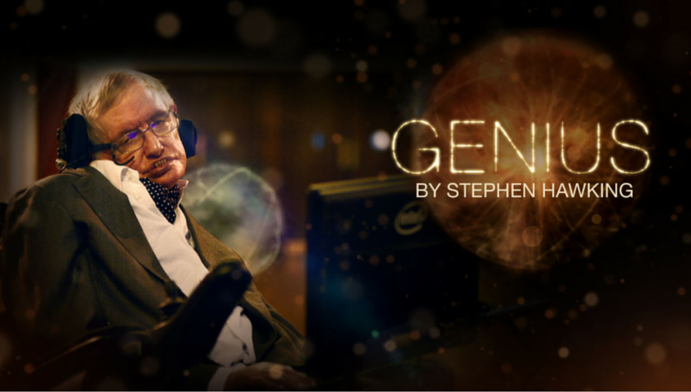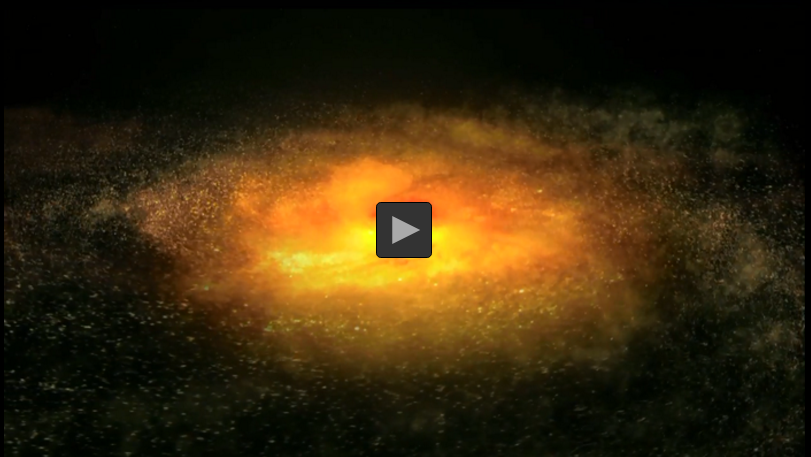
Section Branding
Header Content
Classroom Resources To Support Premiere Of GENIUS By Stephen Hawking
Primary Content

A new six-part science series, GENIUS by Stephen Hawking, will air on GPB Wednesdays at 9:00 p.m. starting May 18 and continuing through June 1. Commissioned by PBS with National Geographic as its international broadcast partner, the series will be presented and narrated by renowned theoretical physicist Stephen Hawking. In each episode, a different group of ordinary people will be challenged to think like the greatest scientific minds in history in order to solve some of humanity’s most enduring questions.
Through the use of large-scale experiments and remarkable demonstrations, the program decodes the mysteries of evolutionary biology, astrophysics and quantum mechanics, solving questions like “Why am I here?,” “Are we alone?” and “Can we travel through time?” Each episode features three people with curious minds who must use their own intellect to learn what humanity’s most notable thinkers have discovered about the greatest scientific mysteries over the centuries. GENIUS takes its participants (and viewers at home) back in time – to ancient Greece, where Eratosthenes calculated the Earth’s circumference – and to more recent history and such thinkers as Edward Hubble, who uncovered and established the distances between our planet and the vast galaxies throughout the universe.
In each of six episodes of GENIUS by Stephen Hawking, Prof. Hawking presents three ordinary people with a series of physical and mental challenges to show them how to think like a genius.
Episode Guide:
Episode 1: “Can We Time Travel?”
Premieres Wednesday, May 18, 2016, 9:00-10:00 p.m. ET.
Join Stephen Hawking as he challenges three ordinary people to determine if time travel is possible. The fascinating journey of discovery features DeLoreans, atomic clocks, a giant black hole and a large swath of New York City.
Episode 2: “Are We Alone?”
Premieres Wednesday, May 18, 2016, 10:00-11:00 p.m. ET.
Join Professor Stephen Hawking as he challenges three ordinary people to work out the likelihood of alien life out there in the universe. See why the team has their minds blown in a way they were never expecting.
Episode 3: “Why Are We Here?”
Premieres Wednesday, May 25, 2016, 9:00-10:00 p.m. ET
Join Stephen Hawking as he sets three ordinary people a truly mind-bending challenge: Can they work out why they exist at all? Hawking takes them down a rabbit hole of profound realizations, helping them think like philosophers as much as scientists.
Episode 4: “Where Did Universe Come From?”
Premieres Wednesday, May 25, 2016, 10:00-11:00 p.m. ET.
Join Stephen Hawking as he challenges three ordinary people to work out where the universe came from. Hawking leads the trio on an extraordinary journey of discovery featuring racing cars, ice-skaters, balloons and running tracks.
Episode 5: “What Are We?”
Premieres Wednesday, June 1, 2016, 9:00-10:00 p.m. ET.
Join Stephen Hawking as he challenges three ordinary people to find out what we really are. Self-assembling machines, light-up bacteria and the world’s first physical demonstration of evolution in action conspire to revolutionize their view of life.
Episode 6: “Where Are We?”
Premieres Wednesday, June 1, 2016, 10:00-11:00 p.m. ET.
Join renowned scientist Stephen Hawking as he challenges three ordinary people to think like a genius. Can they measure the earth, the solar system and even the universe — and find our true place in the cosmos?
Classroom Resources:
Teachers can explore the specific scientific achievements and aspects of Hawking's life, as well as the topics covered in the series with the following classroom resources from PBS LearningMedia. You will need your login and password to access the resources, but it’s simple and free for GA teachers to sign up!
Stephen Hawking Discussion: Lesson Plan
Grades: 6-12
In this class discussion lesson, students learn about specific scientific achievements and aspects of Hawking's life by engaging in a collaborative discussion with peers.
Achievements of Stephen Hawking: Lesson Plan
Grades: 6-12
How did Stephen Hawking use the scientific process to further develop the Big Bang theory? Your class learns more about Hawking’s achievements, as well as his struggles with ALS, in this lesson plan.
The Life and Research of Stephen Hawking
Grades: 6-12
Teach your class about one of the most brilliant and inspirational scientists of our time with this lesson plan highlighting Hawking’s biography.
Black Holes and the Big Bang
Grades: 6-12
Go in-depth with students on the topic of Black Holes and the Big Bang by analyzing Stephen Hawking's explanation of how the universe came to be, and how his work lead to a new era of cosmological research.

Mysteries of Deep Space | Time Travel
Grades: 9-12
Just how BIG is the universe? Students study this question and learn to calculate stellar distances in this lesson.
Sound of the Big Bang
Grades: 6-12
Want to know what the first 760,000 years of the universe sounds like? Teach your class about the Big Bang with a video assist from PBS Digital Studios.
What is Dark Matter
Grades: 6-12
What is the universe made of? Your class gets a lesson on Dark Matter from the Physic Girl!
Why Do We Feel Mind Blown?
Grades: 6-12
A recent study found that learning new words activates the same brain region that’s active when we engage in pleasurable activities, like eating cake or seeing a favorite band perform. Kinda mind-blowing, right? In this video from PBS Digital Studios, students learn about the connection between emotion and learning.
To find out what it’s like to be a genius, a program website on PBS.org will be available closer to premiere. Audiences will be able to learn more about each episode, meet the experts, explore each challenge through slideshows, watch clips and join the social conversation with #HawkingGeniusPBS. Viewers will also be encouraged to participate in an exciting social media campaign surrounding the premiere of GENIUS. Audiences will be asked to give their answers to the big questions in life across a variety of social media platforms. They will also be able to engage with an exciting number of clips and graphics rolling out on PBS social media platforms before the program airs.
About Stephen Hawking:
Prof. Hawking is one of the world’s leading physicists and cosmologists. He is an English theoretical physicist, cosmologist, author and Director of Research at the Centre for Theoretical Cosmology within the University of Cambridge. His scientific works include a collaboration with Roger Penrose on gravitational singularity theorems in the framework of general relativity, and the theoretical prediction that black holes emit radiation, often called Hawking radiation. Hawking was the first to set forth a theory of cosmology explained by a union of the general theory of relativity and quantum mechanics. He is a vigorous supporter of the many-worlds interpretation of quantum mechanics.
He is an Honorary Fellow of the Royal Society of Arts, a lifetime member of the Pontifical Academy of Sciences and a recipient of the Presidential Medal of Freedom, the highest civilian award in the United States. Hawking was the Lucasian Professor of Mathematics at the University of Cambridge between 1979 and 2009 and has achieved commercial success with works of popular science in which he discusses his own theories and cosmology in general; his book A Brief History of Time appeared on the British Sunday Times best-seller list for a record-breaking 237 weeks.
GENIUS by Stephen Hawking is produced by Bigger Bang, which also produced the science films “Hubble’s Cosmic Journey” and “Mission Pluto” for PBS and National Geographic Channels International. Bigger Bang’s Ben Bowie and Iain Riddick serve as the series’ executive producers.





